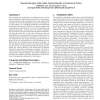Free Online Productivity Tools
i2Speak
i2Symbol
i2OCR
iTex2Img
iWeb2Print
iWeb2Shot
i2Type
iPdf2Split
iPdf2Merge
i2Bopomofo
i2Arabic
i2Style
i2Image
i2PDF
iLatex2Rtf
Sci2ools
119
click to vote
ATAL
2007
Springer
2007
Springer
Hypotheses refinement under topological communication constraints
We investigate the properties of a multiagent system where each (distributed) agent locally perceives its environment. Upon perception of an unexpected event, each agent locally computes its favoured hypothesis and tries to propagate it to other agents, by exchanging hypotheses and supporting arguments (observations). However, we further assume that communication opportunities are severely constrained and change dynamically. In this paper, we mostly investigate the convergence of such systems towards global consistency. We first show that (for a wide class of protocols that we shall define), the communication constraints induced by the topology will not prevent the convergence of the system, at the condition that the system dynamics guarantees that no agent will ever be isolated forever, and that agents have unlimited time for computation and arguments exchange. As this assumption cannot be made in most situations though, we then set up an experimental framework aiming at comparing th...
Related Content
| Added | 12 Aug 2010 |
| Updated | 12 Aug 2010 |
| Type | Conference |
| Year | 2007 |
| Where | ATAL |
| Authors | Gauvain Bourgne, Gael Hette, Nicolas Maudet, Suzanne Pinson |
Comments (0)

